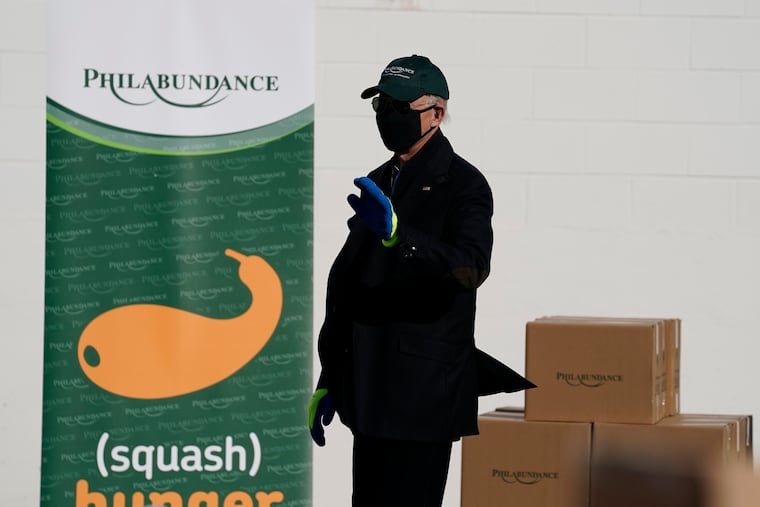Joe Biden’s Philabundance photo-op wouldn’t impress Dr. King | Opinion
MLK said that "true compassion is more than flinging a coin to a beggar." Biden's Philabundance photo op was just another flung coin.

To honor the legacy of the Rev. Dr. Martin Luther King Jr., President-elect Biden came to Philadelphia on Monday to pack groceries at Philabundance, the region’s largest supplier of emergency food. People celebrated his service, although it’s not clear if he or others sought to highlight the public health crisis of food insecurity currently raging alongside COVID-19. Local and national press have picked up Biden’s day of service as a feel-good story, with images of a sane president doing right by the people.
I’m not sure Dr. King would have been impressed. In his 1967 speech at the National Conference on New Politics in Chicago, Dr. King said, “True compassion is more than flinging a coin to a beggar. It understands that an edifice which produces beggars needs restructuring. A true revolution of values will soon look uneasily on the glaring contrast of poverty and wealth.” Philadelphia, as the nation’s poorest big city that was founded on a long, sordid history of stealing lands from the Leni-Lenape and decades of state-sanctioned segregation and ghettoization, is still on that road to Jericho.
But the people of Philadelphia and its suburbs are demanding that revolution. In November, thousands of people danced in the streets to ensure that all votes counted, and tens of thousands marched in the summer and fall to call out police brutality and defend Black lives. We see the violence underneath the coins, and we’re losing patience.
» READ MORE: Biden volunteered in Philly to mark Martin Luther King Jr. Day
I’ve been documenting peoples’ experiences of hunger and food insecurity in Philadelphia since 2000 through the Center for Hunger-Free Communities at Drexel University. Despite repeated calls to get the city to pay attention to soaring hunger rates and the enduring damage to children’s health and well-being, in 2020, over 16% of Philadelphians reported food insecurity. These high rates are reflected in early death from cardiovascular disease among adults, and more hospitalizations and developmental risk among children. Meanwhile, the wealthy and powerful smile for the cameras to celebrate their “service” while they pack beans in boxes.
Dr. King and many others in more recent history such as Andrew Yang (now running for mayor of New York City) and The Poor People’s Movement have advocated for a universal basic income. The solution to poverty, Dr. King asserted, is to abolish it directly with a guaranteed income based on median income, and indexed to inflation, so people are not destined to a lifetime of poverty. For context, the current median income in Philadelphia is just over $46,000 — though to live “comfortably” requires almost $60,000.
Thinking beyond emergency food, it’s also clear that public assistance supports are also inadequate when it comes to hunger. My Philadelphia-based research, in collaboration with colleagues from public health and with lived experience of racism and poverty, shows that SNAP benefits (even with the recent boost) cannot fully eradicate hunger because of the outdated and inadequate calculation of the true cost of food, and even poorer mechanisms for the administration of economic supports. SNAP participants also insist that means-tested programs legitimize ongoing stigma against the poor.
» READ MORE: Welcome to the presidency, Joe Biden. Please solve all these crises.
Alternatively, research on universal basic income shows that it helps people stay healthy and in school or on the job, it reduces mental health problems, and has no impact on employment rates. The city of Stockton in California started universal basic income and is continuing it based on improvements in health and well-being, and the Magnolia Mother’s Trust in Jackson, Mississippi, is already showing great benefits. More cities are also gearing up to try it out. Philadelphia could join in and provide a basic income to ensure dignity and health for all so no one has to suffer the indignity of waiting in line for free food and still be hungry the next day.
When the next political leader comes to Philadelphia to fling their coins, let’s truly honor Dr. King and demand that we work to restructure society so that poverty does not exist. A great place to start is guaranteed income.
Mariana Chilton is a professor at the Dornsife School of Public Health at Drexel University and Director of the Center for Hunger-Free Communities.